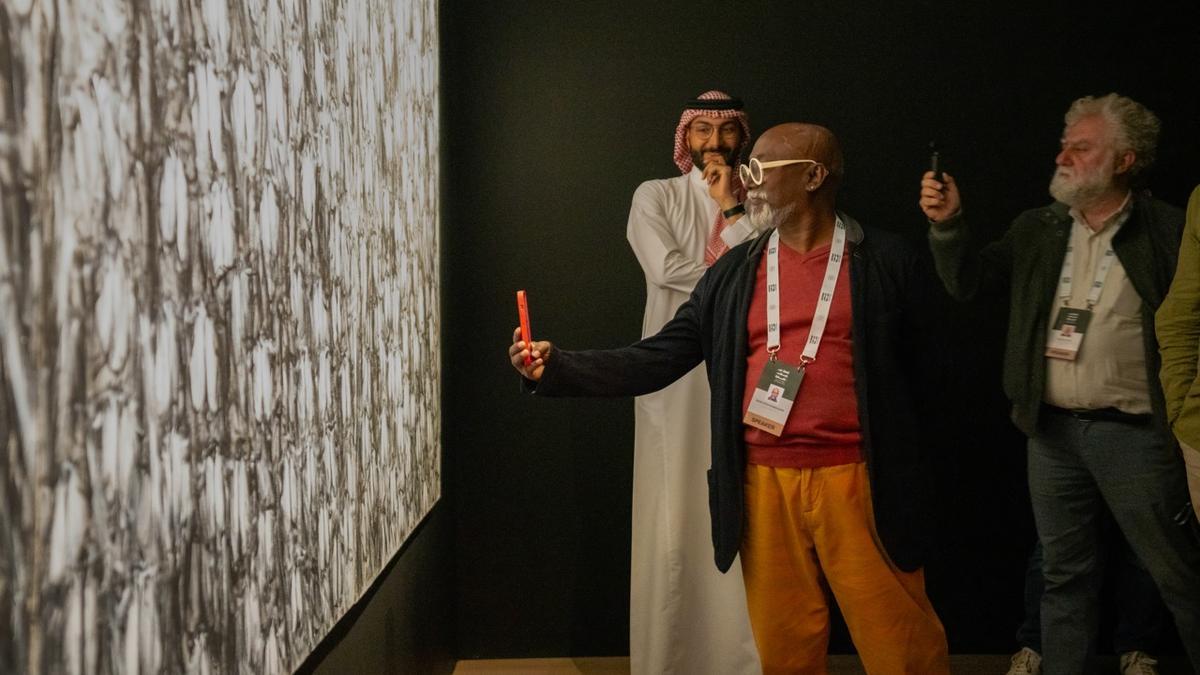
Jazz and film festivals, fashion weeks, book fairs, art biennales, and exhibitions, combined with ambitious plans to build multiple museums—welcome to 21st century Saudi Arabia, where culture hopes to triumph over conservative religious ideology. Ever since Prince Mohammed bin Salman unveiled his Vision 2030 eight years ago, the kingdom is placing significant bets on culture to attract tourism and boost the economy.
To further that vision, the country has already spent about $1.25 trillion on mega building projects, according to global real estate consultants Knight Frank. These initiatives include the Red Sea Project, a concept that aims to rival the Maldives with its stunning archaeological sites, islands, and turquoise waters — all designed to draw the gaze of global visitors. The project has already found admirers, including the internationally renowned footballer Cristiano Ronaldo, who moved to Saudi Arabia two years ago. Ronaldo has recently taken to social media to express his admiration for the country’s landscapes and cultural heritage.
Other initiatives include the ongoing development of AlUla, a 2,000-year-old historic site on the ancient incense route replete with caves and tombs, which is being transformed into a premier cultural destination. It will feature two major museums: a contemporary art museum supported by the Centre Pompidou in Paris and the Museum of the Incense Road. These are just two among 15 cultural properties planned for the area.
This newfound embrace of culture is resulting in an array of conferences and events across Saudi Arabia. Earlier this year, the inaugural Future Culture Summit was hosted in AlUla. Designed to explore how culture can advance human thought, the summit seemed especially timely given the political turmoil in the region. The event featured distinguished speakers like Laurent Le Bon, president of the Centre Pompidou, and Nora Razian of Dubai’s Jameel Arts Center. It kicked off alongside Desert X AlUla, an immersive open-air art exhibition that co-curated by Maya El Khalil and Brazilian documentary filmmaker Marcello Dantas.
The exhibit, titled “In the Presence of Absence,” featured artworks exploring trade, migration, and time, using the expansive desert as a backdrop. “Deserts are full of life, they are full of history and different kinds of life forms. So how do we learn from that environment?” El Khalil pondered.
.
Laurent Le Bon summed up the uniqueness of Saudi Arabia’s evolving cultural scene: “There are not so many countries in the world where among the first possibilities for development is culture.” Jerome Sans, the co-founder of Palais de Tokyo in Paris, also noted the kingdom’s newfound cultural ambitions as fascinating. “Culture opens doors to possibilities, and that is what is happening here now. My colleagues from other institutions, artists, curators, thinkers are here because Saudi is one of the most interesting laboratories of the future — they are rethinking how they should adapt.”
Another noteworthy performance at the summit was given by Professor Eduardo Miranda from the University of Plymouth in the UK, showcasing how quantum computers can help make music by mapping brain waves. This technology has the potential to revolutionize how music is composed and can even assist individuals with special needs. Alongside the summit, an art exhibition titled “More Than Meets the Eye” was held at Maraya—the world’s largest mirrored building—displaying Saudi art from the past 25 years. The exhibition poignantly showcased the complexity and diversity of a nation often misunderstood by outsiders.
Abdullah Al Rashid, director of the King Abdulaziz Center for World Culture in Dhahran (Ithra), commented on this palpable change: “This is a region where a lot has been spoken about, but not much has been heard from. We’ve been running the Saudi film festival for 10 years, and this year our guest program will highlight films from India, not just Bollywood, but independent films too.” This curiosity raises the question of why India, a neighboring country with a rich cultural heritage, hasn’t been more involved in these transformative initiatives so far.
With 63% of its 37 million population under the age of 30, Saudi youth are a driving force behind these changes. Loulwa Al Sharif, who used to perform underground until it became legal for women to sing in public in 2018, represents this shift. As the kingdom’s first female singer to perform at public concerts, she notes how supportive the audience has been. “I was nervous; my hair was uncovered, and the women in the audience were covered, but they were so supportive and sang along,” she recalled. “They came up to me afterwards to say how much they loved my performance. Finally, we have a platform and a chance to be who we are.”
Published – September 06, 2024, 05:13 pm IST
The Hindu Sunday Magazine / culture (general) / arts, culture, and entertainment












